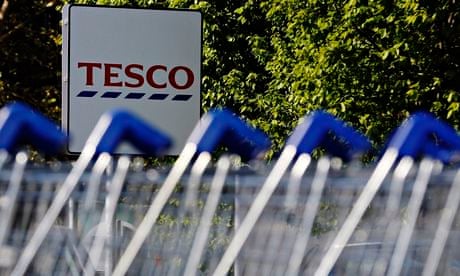Embattled Tesco boss Philip Clarke has signalled it could take another three years to turn around the struggling UK chain and insisted he would be there to finish the job.
After a second year of falling group profits investors are losing confidence in Clarke whose antidote to decreasing sales has been costly store refurbishments and price cuts judged small beer in comparison with rivals' promises.
"I think [the UK business] has started to turn," said Clarke, who claimed he was "two-fifths" of the way through the "big and bold plan" launched in the wake of a shock profit warning in 2012. "I've got no intention of going anywhere. All my waking hours are spent running Tesco – it's what I love. I'm going to see this thing through."
But there were no signs of recovery in the retailer's annual figures with profits at the UK chain falling for the third year, down 3.6% to £2.2bn in the year to 22 February. At a group level profits were down 6% at £3.3bn as stores in Asia and central Europe were buffeted by local economic and political problems as well as self-inflicted trading issues. The fall in profits was accompanied by £1.3bn of writedowns on the value of its European and Chinese operations. The charge is on top of last year's £1bn impairment on failed US venture Fresh & Easy.
Analysts and investors are increasingly concerned that Clarke, who has worked for Tesco for 40 years, is not the right man for the job. He has spent more than £1bn on store refurbishments, extra staff and revamped product ranges, yet the most recent industry data from Kantar Worldpanel shows its market share languishing at a near 10-year low of 28.6%. At its peak, in October 2007, Tesco's share hit 31.8%.
"This is a business that is struggling and there is no clear sign that management have got sufficiently big plans to turn it around," said one investor. "The calls for a change in leadership are only getting louder."
In the fourth quarter UK like-for-like sales tumbled 3% – the worst fall since Clarke took over from Sir Terry Leahy in 2011 – and he warned of more bad news to come. Price cuts, fewer promotions and disruptions caused by store refits would all put a "drag" on sales this year, Clarke said. Asked by one analyst if investors could expect no underlying growth for three years, Clarke gave a cautious reply. "No I don't think we are preparing people for that. We are watching the actions of our competitors very carefully and they are far from clear."
To win back shoppers Tesco launched the first wave of a £200m price cutting campaign back in February. The cuts are focused on staple foods such as milk, bread and vegetables and the retailer said prices were coming down by an average of 24%. Clarke said shoppers wanted more "stable" prices and promised more cuts to come. "We have always said £200m was the start. We retained the flexibility to do what we thought was necessary, and we will. You will see more prices coming down at Tesco in the weeks and months ahead."
Shore Capital analyst Clive Black said shoppers increasingly thought the big supermarkets "speak with forked tongue" about prices as despite talk of price wars official figures show food price inflation picking up. "The time has come for Tesco to show leadership on price," he said.
Tesco launched a store refurbishment programme in 2012 and Clarke said the 300 stores it had revamped were delivering sales increases of 3%-5%."Where the strategy is in place, it works," he said. It will do another 650 this year which he said was a project on an unprecedented scale for the retailer and would cause some sales disruption. It also sees scope to downsize up to 100 of its biggest stores with space let to other retailers or attractions such as soft play areas. As shoppers turn their backs on big stores Tesco has been introducing trendy food brands such as Harris + Hoole coffee shops and Giraffe restaurants which Clarke said were increasingly making its larger premises a "destination for Sunday brunch". It will take three years to complete the refurbishment of the UK chain.
The £1.3bn international writedown included a £734m hit on the value of its European stores as weak sales in key markets such as Ireland and Poland showed no sign of letting up. After failing to crack China on its own, Tesco resorted to a joint venture last year, sparking a £540m writedown. The problems in central Europe resulted in a 27.7% fall in profits to £238m while in Asia they declined 5.6% at £692m, but with both divisions showing progress the shares closed up 7.5p at 293.8p.
Confidence in the UK's biggest retailer has also been dented by a string of senior departures. At the start of this month its finance director Laurie McIlwee tendered his resignation. He is the last member of the senior team other than Clarke to have served alongside Leahy on the board. McIlwee, who had been criticised by investors for his forecasting skills, but denied that there had been a rift over strategy. At what was his final analyst presentation he joked - to nervous laughter – that he had "two words to say to the City". There was relief when they turned out to be "thank you".




Comments (…)
Sign in or create your Guardian account to join the discussion